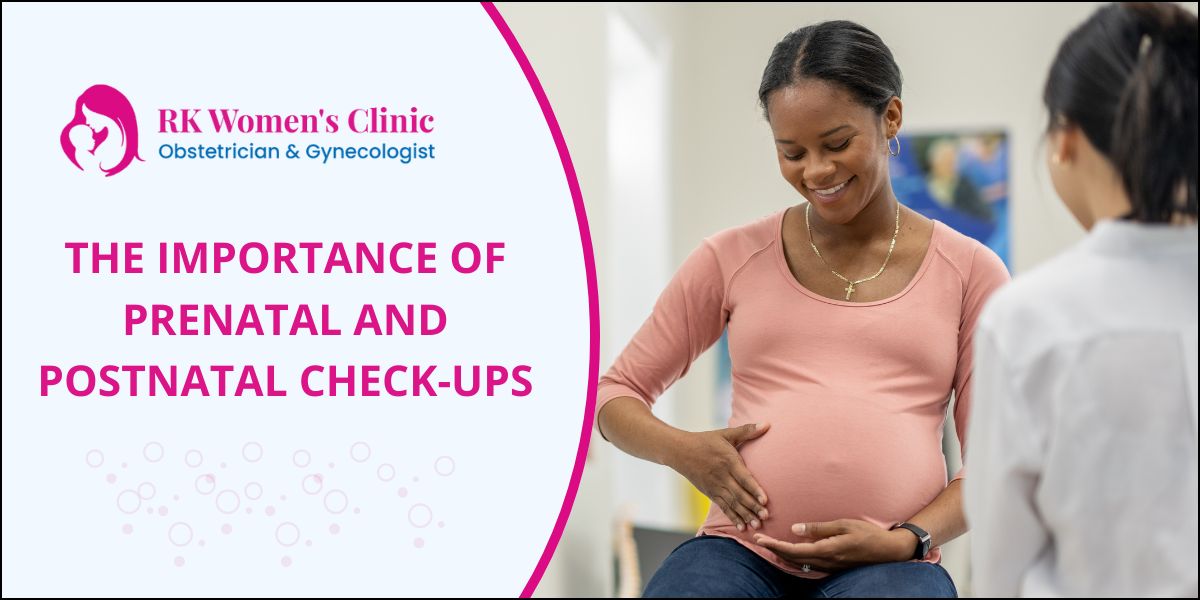Embarking on the journey of motherhood is one of life’s most beautiful and transformative experiences. It’s a time filled with anticipation, joy, and a natural desire to do everything right for your growing baby. Amidst the excitement, two pillars of care stand as non-negotiable for ensuring the health of both mother and child: consistent prenatal check-ups and thorough postnatal check-ups.
Many view pregnancy as a natural process, which it is, but professional medical guidance is crucial for navigating it safely. These regular appointments are not just routine visits; they are proactive steps toward a healthy pregnancy, a safe delivery, and a smooth recovery.
Why Prenatal Check-ups Are Your First Step to a Healthy Pregnancy
Prenatal care begins as soon as you suspect you’re pregnant. These scheduled visits with your gynecologist are designed to monitor the development of your baby and safeguard your own health.
- Early Detection of Issues: Regular screenings and tests can identify potential complications early, such as gestational diabetes, preeclampsia, or birth defects. Early detection often allows for management and treatment, significantly reducing risks.
- Monitoring Baby’s Growth: Through ultrasounds and physical measurements, your doctor tracks the baby’s growth, heartbeat, and position, ensuring everything is progressing as expected.
- Personalized Guidance: Each trimester brings new changes and questions. These appointments are your opportunity to receive expert advice on nutrition, exercise, sleep, and managing common pregnancy symptoms like nausea and fatigue.
- Building a Relationship with Your Doctor: Consistent visits help build a trusted relationship with your healthcare provider. This trust is invaluable when discussing concerns and making decisions about your birth plan.
Skipping these appointments means missing out on this critical, preventative layer of care. Think of them as essential milestones on your road to delivery.
The Critical Role of Postnatal Check-ups: Caring for Mom After Birth
Once the baby arrives, the focus often shifts entirely to the newborn. However, the mother’s health is equally important. The postnatal period, often called the fourth trimester, is a time of significant physical and emotional recovery.
A postnatal check-up, typically scheduled 6 weeks after delivery, is vital for:
- Assessing Physical Recovery: Your gynecologist will check your healing process, whether you had a vaginal delivery or a C-section. This includes examining incision sites, ensuring the uterus is shrinking back to its normal size, and addressing issues like lingering pain or incontinence.
- Mental Health Screening: Postpartum depression and anxiety are common and treatable. This appointment is a safe space to openly discuss your emotional well-being and get the support you need.
- Discussing Family Planning: Talk about contraception options and future pregnancies, allowing your body adequate time to recover.
- Addressing Ongoing Concerns: From breastfeeding challenges to sleep deprivation, this is your time to ask questions and receive professional guidance tailored to your new life as a mother.
Neglecting postnatal care can lead to undiagnosed complications. This check-up is a fundamental part of ensuring you recover fully and healthily to care for your new baby.
Your Partner in Parenthood: Choosing the Right Care
The journey through pregnancy, birth, and beyond is profound. Having a compassionate and experienced medical professional by your side makes all the difference. It’s essential to choose a gynecologist you trust, who listens to your concerns, and provides evidence-based care every step of the way.
For expecting mothers in Thane, seeking a best gynecologist in Kasarvadavali, Thane West is a priority for quality care. Renowned for her expertise and compassionate approach, Dr. Akula Ramya Krishna is dedicated to supporting women through every stage of their motherhood journey. From the first prenatal visit to essential postnatal care, she and her team provide comprehensive support, ensuring both mother and baby receive the best possible start.
Frequently Asked Question
1. How often should you go for prenatal check-ups?
For a healthy, low-risk pregnancy, a typical schedule is:
- Weeks 1-28: One visit per month.
- Weeks 28-36: One visit every two weeks.
- Weeks 36-birth: One visit every week.
Your doctor will create a personalized schedule if your pregnancy is considered high-risk.
2. What is checked during a postnatal visit?
A 6-week postnatal check-up focuses on the mother’s recovery. The doctor will:
- Check physical healing (C-section incision or perineum).
- Screen for postpartum depression and anxiety.
- Discuss birth control options.
- Address concerns about breastfeeding, sleep, and overall well-being.
3. Why is prenatal care important early in pregnancy?
Early prenatal care (in the first trimester) is crucial because the baby’s major organs are forming. Early visits help identify potential risks, establish an accurate due date, and provide essential guidance on nutrition and lifestyle to support healthy development from the start.
4. What happens at your first prenatal appointment?
Your first prenatal visit is often the longest. It typically includes:
- Confirming your pregnancy with a test.
- A thorough medical and family history review.
- A physical exam and possible Pap smear.
- Blood tests and urine analysis.
- Estimating your due date.





